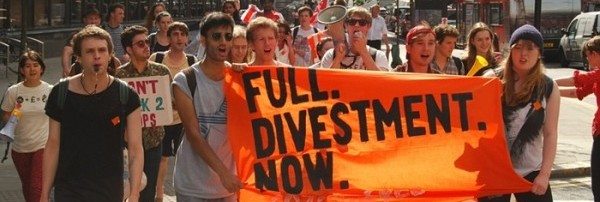Fossil Free and the future of the Left at Warwick
The fossil fuel industry on campus
Warwick has pledged to remove its investments from coal, oil and gas companies at the earliest opportunity. Two years of campaigning, 1500 petition signatures, support from 100 academics and two Sabb teams, several marches, rallies, reports, articles and film screenings, and the University has capitulated completely.
Now, all those who attempted to defeat our ASM motions at the SU, all those who told us we should stay out of the University’s investment portfolio, all those who cynically dodged and misrepresented our arguments, have been proven embarrassingly wrong.
This triumph, however, is a mere battleground victory in a war with a thousand fights. The planet is still hurtling over the climate change cliff, and Fossil Free Warwick are currently holding detailed discussions over the next phase of their campaign.
 Our University is one of the most corporate in the UK – branded Warwick University Ltd. by the great Warwick lecturer and historian E. P. Thompson in 1970. Today, the influence of the fossil fuel industry runs far deeper than the stocks in the University’s investment portfolio.
Our University is one of the most corporate in the UK – branded Warwick University Ltd. by the great Warwick lecturer and historian E. P. Thompson in 1970. Today, the influence of the fossil fuel industry runs far deeper than the stocks in the University’s investment portfolio.
BP – a company currently being sued for alleged complicity in the kidnap and torture of a union activist in Columbia – hosts its only UK-based corporate archive on Warwick’s campus. Fossil fuel companies are regularly present at careers fairs, and one can find BP and Shell’s names on a list thanking Warwick’s original donors outside Senate House.
The cards were thus stacked against Fossil Free Warwick when it first formed in 2013. The tenacious work of around 25 dedicated campaigners, however, weakened – but has not yet broken – the power this industry holds over the University.
The decision
A careful look at the decision, and how it was announced, reveals much about the power dynamics at the University of Warwick in 2015.
Compare the way the University’s decision was announced with the equivalent declaration at SOAS, University of London. Warwick’s release barely mentioned climate change, the fossil fuel industry, or the word divestment. They’ve seemingly made no attempt to capitalise on the positive PR that could come from this decision. SOAS, by contrast, immediately professed its pride in being “the first university in London to divest”.
Why the reticence to clasp such an opportunity to promote Warwick’s image? Indeed, why did it take them two years to make this decision? From management’s perspective, they seem to have little to lose. We know there are no negative financial implications to divestment.
The University can portray itself as forward-thinking and progressive, after a year of PR disasters. And they get to placate a student group that has been a thorn in their side for two years.
It’s not hard establish the answer to this seeming conundrum. University management are subject to a series of pressures from the institutional make-up of the University, wider structures in higher education, and different interest groups.
Students concerns, when unaccompanied by significant campaigning and action by student groups, are subordinated to the imperative to run the University like a business. To have any power, we had to exert massive pressure on the University to overcome an alternative interest group with tentacles all over campus: the fossil fuel industry.
Clearly, the insidious influence this industry maintains over the University’s decision-making structure was, for the past two years, more of a powerful factor than the clamouring voices of the majority of students. Make no mistake: the only reason this motion has passed is because of the hard work, tenacious efforts and tactical astuteness of Fossil Free Warwick. Read between the lines of the statement from the Chair of Council, Sir George Cox, and see the University admit as much:
“Warwick’s students… seek to challenge all of us to consider and reflect on how we as a community can have an impact on this issue both together and as individuals. Throughout the discussions leading up to today our students have presented clear arguments that they wanted Council to hear and take seriously and they can be assured by the outcome of our meeting today that Council has done so.”
The Future of Fossil Free and the Left at Warwick
We can’t allow divestment to be the end game for climate activism at Warwick.
As relentless Fossil Free Warwick member Dan Goss said, “[w]e’re overjoyed by this victory – but it’s just the beginning. Divestment is the spring board for a united front against the fossil fuel industry globally and on campuses.”
It’s not just Fossil Free that’s on the offensive; it’s clear from an examination of the political atmosphere at Warwick that the campus Left is in a better position than it has been for years.
The Non-Aligned Leftist Forum is moving into its second year, a great platform for discussing tactical and ideological differences within the Left on campus, and introducing new students to our ideas.
Warwick for Free Education are also seeking to consolidate and expand, after an impressive first year which saw them facing down dramatic police violence and court injunctions.
The Warwick Globalist, a traditionally progressive and critical international affairs magazine, is undergoing a complete relaunch, including moving into in-depth reporting on campus issues.
Warwick Anti-Sexism Society, Warwick Anti-Racism Society, and Warwick Labour will still be doing important work.
And, of course, Fossil Free Warwick will be launching their new climate change-campaign.
It’s not an exaggeration to suggest that Warwick is becoming one of the most politically active universities in the UK. Perhaps the days of Red Warwick are not lost forever.

Comments